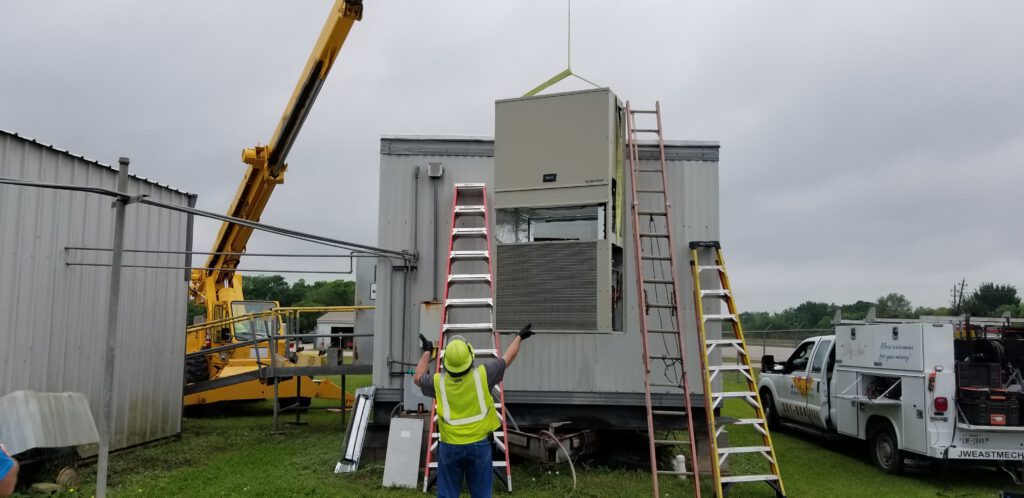In Houston, modular buildings are used for a variety of purposes due to their versatility, cost-effectiveness, and quick construction timelines. They can be multi-storied and cover thousands of square feet, making them ideal for temporary education and institutional needs or even church space on Sunday.
Modular buildings have unique heating and cooling needs compared to traditional structures due to their design, construction, and characteristics. Because these buildings have different air conditioning systems, they require a technician who is licensed and trained in modular HVAC.
Some aspects that make the heating and cooling requirements of modular buildings distinctive include:
Limited Space: Modular buildings are often built with space-saving considerations in mind, leading to compact layouts that may present challenges for installing traditional HVAC systems. This limitation may require more innovative and flexible heating and cooling solutions to fit within the confined spaces.
Mobility and Flexibility: Modular buildings are designed for easy assembly, disassembly, and relocation. Heating and cooling systems in modular buildings need to be adaptable to frequent moves and reconfigurations, requiring systems that are portable or easy to uninstall and reinstall.
Insulation and Energy Efficiency: Due to the modular construction process, ensuring proper insulation and energy efficiency is crucial in modular buildings. Effective heating and cooling systems need to be able to maintain comfortable indoor temperatures while maximizing energy efficiency to minimize heating or cooling costs.
Multiple Modules: Large modular buildings often consist of multiple modules or sections that are interconnected. This setup can create thermal efficiency challenges, as each module may have different heating and cooling requirements. HVAC systems must be able to address these variations and provide consistent comfort throughout the building.
Ventilation and Air Quality: Proper ventilation and indoor air quality management are essential in modular buildings to ensure a healthy and comfortable indoor environment. Heating and cooling systems must be equipped with adequate ventilation solutions to maintain air circulation and quality, especially in enclosed modular spaces.
Regulatory Compliance: Modular buildings must adhere to building codes and regulations governing HVAC systems. Heating and cooling solutions in modular buildings need to meet specific standards to ensure compliance with local building regulations and ensure occupant safety and comfort.
Scalability and Customization: Modular buildings often serve diverse purposes, from temporary offices to permanent residential units. Heating and cooling systems in modular buildings must be scalable and customizable to accommodate varying usage requirements and occupant preferences.
Because of the differences listed above, servicing an HVAC system in a modular building requires a specialized technician. When you hire an expert as opposed to a residential HVAC technician you can expect the following:
Specialized Expertise: A modular HVAC expert is trained and experienced in working with these specialized systems, ensuring optimal performance and efficiency.
Custom Solutions: Modular HVAC experts can provide custom solutions tailored to the specific needs of modular buildings or spaces. They understand the intricacies of modular HVAC systems and can design solutions that maximize energy efficiency and comfort.
Efficient Installation: Modular HVAC systems often have different installation requirements compared to traditional systems. A modular HVAC expert knows how to efficiently install these systems in modular buildings, saving time and ensuring proper functioning from the start.
Up-to-Date Knowledge: HVAC technology is constantly evolving, and modular HVAC experts stay current with the latest advancements and best practices in the industry. They can recommend innovative solutions that improve performance and reduce operating costs.
Troubleshooting Skills: Modular HVAC experts have specialized troubleshooting skills to diagnose and resolve issues specific to modular HVAC systems. Their expertise can help prevent downtime and costly repairs in the long run.
Regulatory Compliance: Modular HVAC systems must meet regulatory requirements and standards. A modular HVAC expert is well-versed in these regulations and ensures that your system adheres to all relevant codes and guidelines.
At JW East Mechanical we have extensive air conditioning service, repair, and installation experience with modular buildings across all industries – industrial, commercial, and educational. We understand how these buildings work inside and out, and can quickly diagnose and fix any HVAC problem that might occur. If you are experiencing any HVAC issue in your modular building or have questions about installation, call the experts at JW East!

